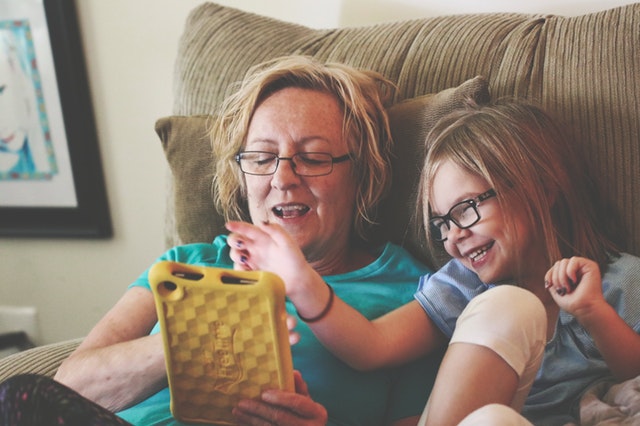I am more scared about spending all day every day with my 4 kids and their different emotions and stages than I am about getting a virus. Mom on facebook.

We are floundering in uncharted territory. Never could we imagine the scenario we are all living with this coronavirus. Now more than ever is the time to BREATHE, give everyone a break, and connect with those precious children of yours.
Yet at the same time, you and the people around you may be flipping in and out of panic or at least worry, fear, and overwhelm. You’re all cooped up in one place together and will drive each other crazy!
This is the greatest unknown we have ever faced. Humans need a sense of certainty and security. This pandemic has taken every shred of that out from under us. I offer here a few suggestions and realize every home situation is different.

Managing yourself in this predicament:
- Many of you and your children have an inherent stamina to weather the storm, to acknowledge there is nothing to be done but wait it out. But others who have an enormous sensitivity to their own and other people’s tension and anxiety, just feel everything more intensely. For those, the need for order and stability is even greater. As well as the need for self-care.
- Check in on your need to control. The more you need it, the more you become victim to fear and panic. When you feel it coming up, that’s the time for breathing deeply at the very least and maybe walking outside.
- Check your catastrophizing. If you fear you will never work again, recognize that as a fear, not a fact. Then turn it into a fact. This is hard right now being out of work. I get afraid easily. Then your fear becomes self-compassion.
- Find a mantra when that feeling of anxiety or panic arises. Something like, I can do this, We have each other, One day at a time, Keep on keeping on.
- Actually schedule a time each day or at least every other to connect with a partner or trusted friend to explode your worry. Seriously. Do not try to bottle it up for the sake of your kids. You will be far calmer with your kids if you let out your anger, fear, or panic with someone who promises not to tell you to just calm down.

- This can be a time to do things you never have time to do. Take a learning program or online yoga class, clean out that closet, wash windows. Plan something that can involve all of you. Or take on a project just for yourself you can do after the kids are in bed.
- Practice connection. Watch for what each of your children needs, how they are different. Pay attention to and connect with the underlying emotions provoking behavior instead of yelling at or threatening the behavior.
- If your kids are focused on screens, learn from them. Ask what about this game fascinates, challenges your child. Ask them to teach you how to play.
- Have fun.

If you and your spouse are both working from home:
- There will be distractions galore. Plan with your partner on-call working hours when you, not your partner can be distracted. Say from 9:00-11:00, if kids need someone, you are the go-to, not your partner.
- Wear a certain color when you are not to be disturbed unless the house is on fire.
- Designate certain hours when each of you are with the kids so the other can work—and when you are together as a family. Make it clear.

Talking to your kids about coronavirus:
- The most important thing to keep in mind is egocentrism consumes your children’s brains until at least age seven, and then it only starts to wane. Your young children are concerned about one thing—what does this mean for me? Don’t expect kindness and consideration for others. But do model it.
- It’s important to be able to answer your children’s questions honestly. That doesn’t mean every last detail. It just means don’t lie. It’s a tricky balance to communicate the seriousness of this pandemic to understand why they have to stay home, forgo playdates and sleep-overs, not take the car to visit friends, and wash their hands 20 times a day without instilling unnecessary fear.
- Talk about how germs spread and scatter. Tell them that some germs give us a cold and some germs make us very sick. That’s why we have to be very careful about keeping our bodies healthy so they can fight off the bad germs.
- Here’s a great page explaining the virus for little kids clearly and without provoking fear.
- Also a great video to encourage washing hands. Do the experiment at home.
- For all kids, it is safe to emphasize that children either do not get the virus or have it so mildly it feels like a cold. Let them know, that you also would probably get it mildly. The reason it is so critical to stay home away from people is because it is so very contagious, spreadable. And that old people and those who are already very sick can actually die of it.
- And yes, let them know this is critical for their grandparents. But they will be fine as long as they don’t get the germs.
- With kids old enough to understand, talk about what you are all doing to help contain the spread of the virus even if you aren’t in danger yourselves. Discuss why it’s wrong to get together with other people on the chance you might pick up some germs and pass them on injuring people you may not even know. It’s a great time to talk about doing the right thing.
- Plan ahead for how each child wants to handle meltdowns. Discuss the reality of being together all the time. What works best for each? Some may want alone time in their rooms. Some may want to stick to you more than ever. How will you all respect each other’s needs including yours?

Talking to your kids about schoolwork:
- Some kids are self-motivated and confident and will do their work no problem. But some are resistant to working. Others are perfectionists who worry they aren’t going to do it right.
- It’s important to connect with each child’s reality. The one who doesn’t want to work needs to hear that you get how hard it is do school work at home—“This doesn’t seem right, does it? You’re home and it feels like vacation. We have to figure out a whole new strategy, don’t we? And I need your help to figure that out.”
- The one who is panicked about doing her work right and who screams at you because you don’t know how to do it does not need you to try to talk her out of her panic with, “It’s going to be okay. Just relax.” What she needs is to hear your genuine understanding of how bad it feels when she’s worried and her teacher isn’t here to help and you don’t know what the teacher wants.
- Empathize and connect first so your child feels gotten. Then emotions can calm. Give it some time. Then talk about what the plan will be to do it. Never try to problem solve when emotions are high.
- Plan a day of unschooling. Get outside. Try no screens. Watch what they do.

Develop daily routines:
Kids need certainty and order in their days—and you do to. Some need more than others, but all need some.
- Schedule a family meeting to discuss your new way of living and develop your routines together. And I do mean together. Get your kids suggestions. If they want to be on screens all day, take that suggestion. Then bring in your own and come to an agreement that works for all. Remember, the less your kids are involved in creating the routine, the more they will resist your requirements.
- Here’s a day idea. Use it to brainstorm your own:
- Morning: Don’t start right off with schoolwork. Make mornings fun. Plan a yoga class you can do with your kids on YouTube. Learn to meditate as a family. Go for a walk and practice social distancing. Get in the car and decide on games to play. Count how many chimneys you see, how many street signs. Practice reading signs.
- School time with a snack break. Build in time for art and music.
- Free time: Each chooses what they want, knowing this is your time too. If it’s screentime, so be it. If there are not enough screens, they work out who will share what.
- Laundry/job time: Everyone gets a job to do.
- As soon as everyone is done, it’s activity time, outside if possible.
- Alone and separated reading or quiet time to be away from each other.
- Cooking and prep time: everyone gets a job from putting silverware on the table to chopping vegetables to learning how to cook a dish. Talk about how food keeps us healthy and what foods weaken us—but not at the table.
- Dinnertime: talk about what’s bad and what’s good about being stuck at home. Ask, what did you do for someone today, how did you help? Play “I Spy”. Don’t talk about food! With teens, talk about news, who you connected with—anything but what they should be doing.
- Evening: Look at old family videos and pictures. Choose a family movie with popcorn. Have a dance party.

Other ideas:
This can be an opportunity not only to have lots of practice time to connect with your kids but also to teach them values and respect needed during this time. Everyone in the world is in the same boat, experiencing the same thing. We’re all in this together. No matter what your children’s ages, they need to understand this—well, not babies and toddlers, maybe.
You might think about keeping a Coronavirus journal. Each day, perhaps at dinnertime, take turns writing a few sentences about how this crazy time is going for everyone.
Discuss what it means to take responsibility for oneself and as a family. Why, for instance, is it wrong to buy all the toilet paper or hand sanitizer on the shelf?
Relax screentime rules but don’t go free-range. Instead of quantity, think quality.
Use YouTube for all of you to learn a new skill together, watch cooking shows, travel to other countries with Rick Steves, learn about animals in Africa.
Remember to thank all the service providers who are still working so you get food, medicine, etc.
A Few Resources for Young Children:
1. Union Square Play – streaming FREE Music
Classes and Potty Training Seminars!
2. Jam with Jamie – Live streams and pre-recorded classes.
3. Cosmic Kids Yoga – All kinds of yoga for kids..
4. Headspace has a kids meditation section.
5. Cincinnati zoo is streaming on facetime.
6. The New England Aquarium has a Watch from Home section.
7. Art for Kids
8. Pigeon Presents – fun with Mo Willems







